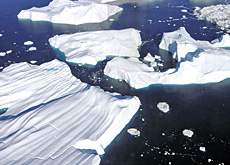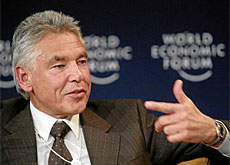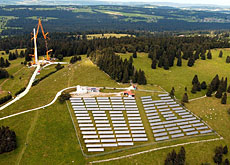Swiss urge action over “alarming” climate study

A United Nations climate change body has concluded that global warming is "very likely" to have been man-made and is expected to continue for centuries.
The much-awaited report, released by the Intergovernmental Panel on Climate Change (IPCC) in Paris on Friday, has been met with a mixture of apprehension and calls for action in Switzerland.
The influential IPCC study said temperatures were probably going to increase by 1.8-4 degrees Celsius by the end of the century. It also projected that sea levels were most likely to rise by 28-43cm, and global warming could influence the intensity of tropical storms.
Swiss Environment Minister Moritz Leuenberger, who also was in Paris for an environment conference, called the study “alarming”.
“The report will influence international climate policy negotiations beyond 2012,” he said, adding that neither taxes nor voluntary measures were sufficient.
“As an alpine country, Switzerland is particularly affected by climate change. It’s in its basic interest that proper regulations are in place after the current Kyoto Protocol runs out in 2012.”
CO2 tax
Leuenberger again repeated his support for a global carbon dioxide tax to help tackle climate change, an idea that he had proposed at Post-Kyoto climate talks in Nairobi in November.
“For [the concept] to remain credible internationally, Switzerland now has to finally make the CO2 tax work at the national level.”
Switzerland has adopted the Kyoto Protocol and in December parliament agreed to the introduction in stages of a controversial CO2 tax.
It has also introduced the so-called “climate cent”, a legally non-binding charge levied on petrol and diesel imports at a rate of 1.5 centimes per litre.
The environment minister also voiced his support for a plan for an international environment organisation that would “better protect the environment and help us to better understand its problems”.
Political parties
In Switzerland, there was general consensus among the main political parties that the scenario was dramatic and action was urgently required.
“International efforts are indeed important,” said the centre-right Radical Party. “But Switzerland must above all meet its obligations at the national level.”
The right-left Social Democratic Party said it was keen to see CO2 taxes become a reality in Switzerland and, like the Green Party, called for an urgent debate on Swiss climate policy following the release of the IPCC report.
“It’s high time that we finally take convincing measures,” it declared in a statement.
The centre-right Christian Democrats, said that action at the national level was critical, but business seemed to have woken up to the fact that something had to be done.
The rightwing Swiss People’s Party for its part called into question the dramatic nature of the report’s conclusions, asserting that the climate went through “natural cycles”.
The party said it remains convinced that unilateral measures in Switzerland would not help and only harm the economy.
swissinfo with agencies
The Intergovernmental Panel on Climate Change (IPCC) was established in 1988 by two UN organisations, the World Meteorological Organization (WMO) and the UN Environment Programme (Unep) to assess the “risk of human-induced climate change”.
The Panel is open to all members of the WMO and Unep.
IPCC reports are widely cited in almost any debate related to climate change.
National and international responses to climate change generally regard the UN climate panel as authoritative.
On February 1, 2006, over 500 scientists and government officials from the IPCC formally agreed on a 21-page summary of findings called Climate Change 2007: The Physical Science Basis. It is the first part of the fourth such report to be issued since 1990.
The report will add to growing calls for action to tackle global warming and could influence government and business policy worldwide.
Two other parts, on the impact of climate change and measures to tackle the issue, will be published in April and May, respectively.
In the latest IPCC report scientists said it was “very likely” – or more than 90% probable – that global warming was man-made.
The report predicts a “best estimate” that temperatures would rise by between 1.8-4°C in the 21st century, within a likely range from 1.1-6.4°C.
The study projects a rise in sea levels of between 28-43cm in the 21st century – and said bigger gains could not be ruled out if ice sheets in Antarctica and Greenland thaw.

In compliance with the JTI standards
More: SWI swissinfo.ch certified by the Journalism Trust Initiative












You can find an overview of ongoing debates with our journalists here . Please join us!
If you want to start a conversation about a topic raised in this article or want to report factual errors, email us at english@swissinfo.ch.